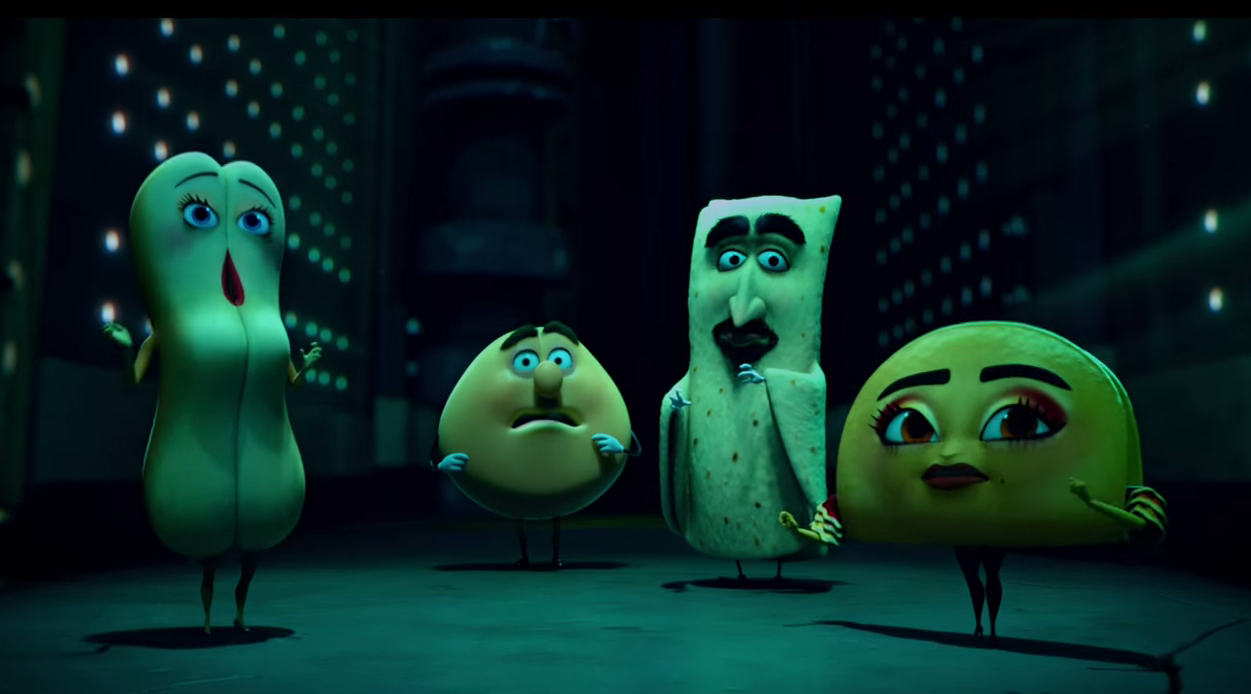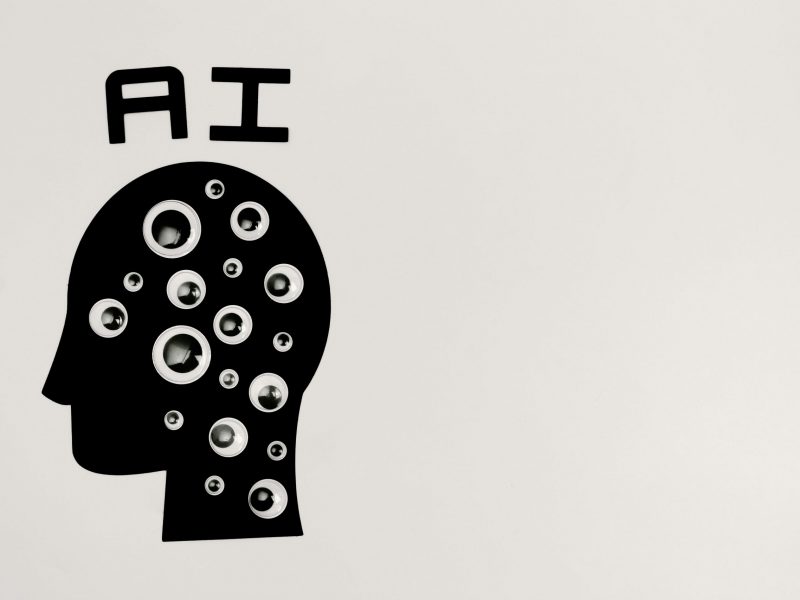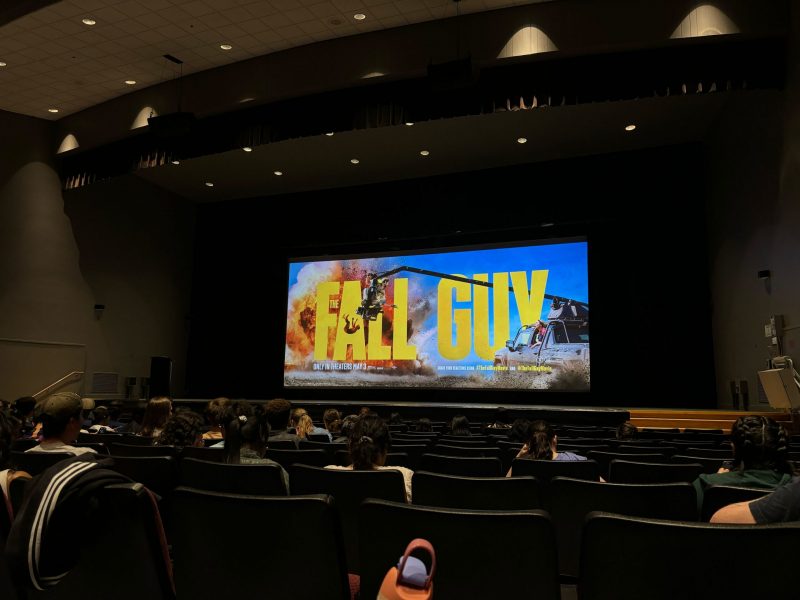It starts out innocently enough, with computer animation eerily similar to that of the Toy Story series. Masses of food are crammed neatly into supermarket shelves as they spryly join their voices in their daily serenade to the “gods.” The assortment of animated cuisine and beverages believe that these deities, merely humans strolling through a grocery store, will lead them to the “Great Beyond” — a magical destination where all their wildest dreams become reality. And for the hot dog Frank (Seth Rogen) and his hot dog bun crush Brenda (Kristen Wiig), it’s “Red, White and Blue Day” — also known as “Fourth of July” for us humans — which means there’s no better time than the present for the edible lovers to be snagged by a god, placed delicately into a shopping cart and escorted out those automatic double doors to the place they know nothing about but longingly seek.
But this is a film co-written and co-produced by Rogen, known for his roles in outrageously funny films like 2014’s The Interview and 2008’s Pineapple Express. So, it only makes sense that his latest film, Sausage Party, charts a new course away from the childlike innocence of many animated movies that it mimics in design.
Sausage Party reaches new heights, scaling to the pinnacle of unsettling humor that can leave you gasping for air between laughter while questioning why you’re even finding humor in a minutes-long food orgy in the first place. Yes, you read that right — for what seemed like five minutes, I witnessed a chaotic scene that included a taco eating out a hot dog bun, a bagel licking the balls of a Armenian lavash and so many other combinations of food in weird contortions of wildly abrasive sex. And yes, I chuckled and snorted like a madman, but I also felt compelled to hop in a shower and cleanse myself of whatever the hell I just witnessed.
That doesn’t mean the movie was bad or simply full of humor you would expect from a 16-year-old with access to the best animation technology around (although it certainly didn’t lack in that category). In some strange way, Sausage Party managed to make profound points about organized religion and the meaning of life all while cramming an immeasurable amount of cuss words and drug references into its 89-minute runtime.
Brenda and Frank are separated from their companions due to a shopping cart collision that knocks them to the floor of the supermarket. They become fast friends with the Jewish Sammy Bagel Jr. (Edward Norton), an Armenian lavash (David Krumholtz) and a sex-loving lesbian Latina taco (Salma Hayek). Frank becomes skeptical of the “Great Beyond,” but the rest of the group chides him for lacking faith, eventually abandoning him to return back to their shelves in the hopes of being selected by the gods the next day. But Frank sets out to uncover the truth about the “Great Beyond,” soon learning that reality is far from what the food believe it to be. The film then ends as the supermarket becomes the scene of an all-out-war between food and man — aided, of course, by the use of bath salts to awaken humans to the true nature of their edible goods — that concludes with a feel-good vibe even though dead bodies litter the grocery store.
Too crazy to be concisely described, the plot of Sausage Party contains another dozen jarring twists-and-turns. The heroes of the film are hunted by Douche (Nick Kroll), a vengeful douchebag in both senses of the word, who blames Frank for the shopping cart collision that rendered him useless. Other big-name actors play their own part including an ill-fated human drug addict (James Franco), the runt of the hot dog litter named Barry who helps save the day (Michael Cera) and the aged liquor bottle Firewater who helped make up the story of the “Great Beyond” (Bill Hader).
Sausage Party is heavy handed with its use of stereotypes — the hypersexual Latina taco and the Bavarian Mustard dressed as Hitler screaming about “the Juice” — but those characterizations sometimes bring about the film’s best moments. Krumholtz’s lavash and Norton’s bagel, after growing fond of one another, return to their sides of their aisle — the Halaal and Kosher sections, respectively — and must pretend to hate one another in an allusion to the Israeli-Palestinian conflict. And the film manages to make a point about how humans can corrupt religious texts to suit their own needs, as Hader’s Firewater bemoans that different groups of food have twisted messages about the gods and the “Great Beyond” to justify their own prejudices. These messages are not in themselves daring, but they certainly seem so when featured in a film that packs more scenes of food fornification in one viewing than I’ve ever cared to see in my lifetime.
As the first R-rated CGI-animated film, Sausage Party is surprisingly astute, and it all seems like one big metaphor — we are the food, the humans are our own mortality, the shopping center is our world and the “Great Beyond” is whatever we believe to placate our own fears. We can opt to live solely by our rigid beliefs, the film seems to say, or we can face the harsher realities of the world and find a way to bridge our differences. It’s not a message that I expected to get out of Sausage Party, but it’s a pleasant surprise that shows some depth. Rogen and his team took a risk by meshing animations usually reserved for whimsical story lines with their own brand of profane humor. But they came out with a heartwarming product that is at times completely mindless but at other points filled to the brim with deep introspection on universal human problems. I’m still not quite sure how Sausage Party managed to pull that off, but one thing seems clear — this won’t be the last we see of adult-oriented CGI-animated films, whether we like it or not.



